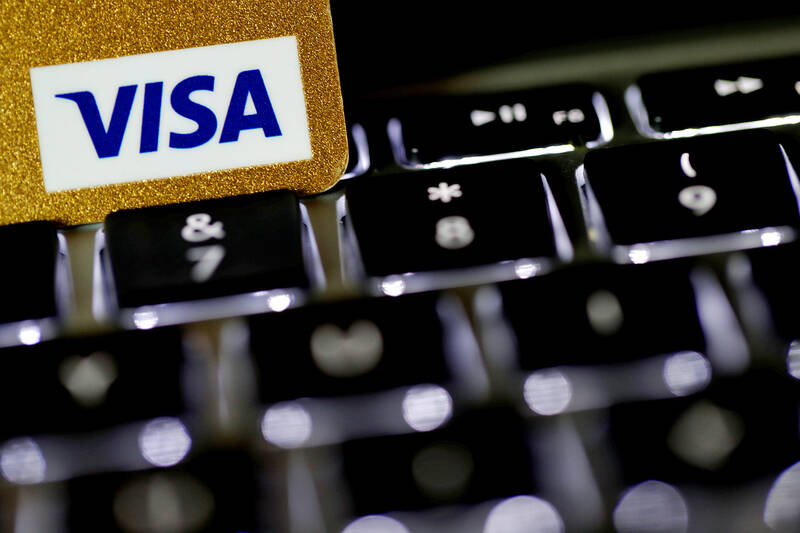The Criminal Investigation Bureau (CIB) has arrested 17 people in central Taiwan who are suspected of using phishing messages sent to cellphones to steal credit card information and make purchases online.
The bureau’s Telecommunications Investigation Corps and Taichung City Police arrested the suspects during seven raids conducted from October last year to last month, police said.
An investigation was launched after it was discovered that a massive number of suspicious text messages were being sent from specific mobile phone numbers in central Taiwan, they said.

Photo: Reuters
Recipients of the messages — which appeared to be sent from telecom companies, Far Eastern Electronic Toll Collection Co and motor vehicle offices — were told that their “points” were about to expire and they should use them quickly to make purchases, or that they had unpaid toll fees or fuel taxes, police said.
The messages included links to sites where people could enter their credit card information, investigators found. Scammers allegedly used the credit card numbers on Apple Pay, Google Pay and other mobile payment platforms to make purchases online.
Police identified the primary suspect as a Taiwanese man surnamed Tu (杜), saying he had asked Chinese engineers to set up the phishing Web sites and used an SMS gateway device to mass distribute the text messages.
Tu directed his accomplices to use the captured credit card numbers to purchase luxury items, iPhones and points for online games, the police said.
One of the accomplices, surnamed Liao (廖), allegedly obtained 12,000 sets of credit card numbers using phishing messages in Taiwan and 44 other countries.
Three hundred of the credit card numbers were from Taiwan, police said, adding that the group successfully used 35 of them to purchase goods worth more than NT$2 million (US$63,391).
The Taichung Prosecutors’ Office is investigating whether the group contravened the Organized Crime Prevention Act (組織犯罪防制條例), Money Laundering Control Act (洗錢防制法) and Personal Data Protection Act (個人資料保護法).
The Taichung District Court ordered that Tu and another accomplice, surnamed Hsu (徐), be detained.

‘DENIAL DEFENSE’: The US would increase its military presence with uncrewed ships, and submarines, while boosting defense in the Indo-Pacific, a Pete Hegseth memo said The US is reorienting its military strategy to focus primarily on deterring a potential Chinese invasion of Taiwan, a memo signed by US Secretary of Defense Pete Hegseth showed. The memo also called on Taiwan to increase its defense spending. The document, known as the “Interim National Defense Strategic Guidance,” was distributed this month and detailed the national defense plans of US President Donald Trump’s administration, an article in the Washington Post said on Saturday. It outlines how the US can prepare for a potential war with China and defend itself from threats in the “near abroad,” including Greenland and the Panama

The Chinese Nationalist Party (KMT) is maintaining close ties with Beijing, the Democratic Progressive Party (DPP) said yesterday, hours after a new round of Chinese military drills in the Taiwan Strait began. Political parties in a democracy have a responsibility to be loyal to the nation and defend its sovereignty, DPP spokesman Justin Wu (吳崢) told a news conference in Taipei. His comments came hours after Beijing announced via Chinese state media that the Chinese People’s Liberation Army’s Eastern Theater Command was holding large-scale drills simulating a multi-pronged attack on Taiwan. Contrary to the KMT’s claims that it is staunchly anti-communist, KMT Deputy

RESPONSE: The government would investigate incidents of Taiwanese entertainers in China promoting CCP propaganda online in contravention of the law, the source said Taiwanese entertainers living in China who are found to have contravened cross-strait regulations or collaborated with the Chinese Communist Party (CCP) could be subject to fines, a source said on Sunday. Several Taiwanese entertainers have posted on the social media platform Sina Weibo saying that Taiwan “must be returned” to China, and sharing news articles from Chinese state media. In response, the Mainland Affairs Council (MAC) has asked the Ministry of Culture to investigate whether the entertainers had contravened any laws, and asked for them to be questioned upon their return to Taiwan, an official familiar with the matter said. To curb repeated

Myanmar has turned down an offer of assistance from Taiwanese search-and-rescue teams after a magnitude 7.7 earthquake struck the nation on Friday last week, saying other international aid is sufficient, the National Fire Agency said yesterday. More than 1,700 have been killed and 3,400 injured in the quake that struck near the central Myanmar city of Mandalay early on Friday afternoon, followed minutes later by a magnitude 6.7 aftershock. Worldwide, 13 international search-and-rescue teams have been deployed, with another 13 teams mobilizing, the agency said. Taiwan’s search-and-rescue teams were on standby, but have since been told to stand down, as